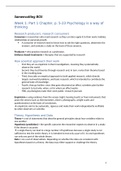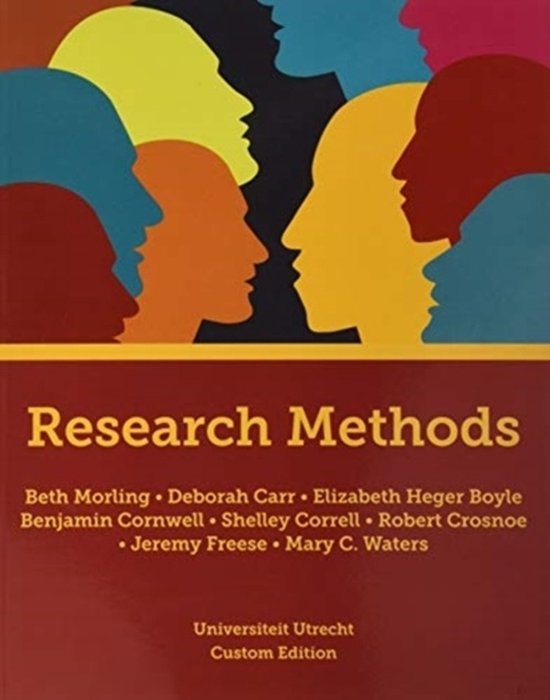Samenvatting BOS
Week 1: Part 1 Chapter, p. 5-23 Psychology is a way of
thinking
Research producers, research consumers
Consumers = researchers who read research so they can later apply it to their work, hobbies,
relationships or personal growth.
A consumer of research need to know how to ask the right questions, determine the
answers, and evaluate a study on the basis of those answers.
Producers = who practice research as a profession.
Evidence-based-treatments = therapies that are supported by research
How scientist approach their work
- First they act as empiricist in their investigations, meaning they systematically
observe the world.
- Second, they test theories through research and, in turn, revise their theories based
in the resulting data.
- Third, they take an empirical approach to both applied research, which directly
targets real-world problems, and basic research, which is intended to contribute the
general body of knowledge.
- Fourth, they go further: once they gave discovered an effect, scientists plan further
research to test why, when, or for whom an effect works.
- Fifth, psychologists make their work public: research journals
Empiricism = using evidence from the senses (sight, hearing touch) or from instruments that
assist the senses (such as thermometers, timers, photographs, weight scales and
questionnaires) as the basis of conclusions.
empiricists aim to be systematic, rigorous and make their work independently verifiable
by other observers or scientist.
Theory, Hypothesis and Data
Theory = a set of statements that describe general principles about how variables relate to
one another.
Hypothesis (prediction) = the specific outcome the researcher expects to observe in a study
if the theory is accurate.
a single theory can lead to a large number of hypotheses because a single study is not
sufficient to test the entire theory. It is intended to test only a part of it. So one hypotheses
can only one part of the whole theory.
Data = are a set of observations. Depending on whether the data are consistent with
hypotheses based on a theory, the data may either support or challenge the theory.
1
,Data that matches the theory’s
hypothesis strengthen the researcher’s
confidence in the theory. When the
data do not match the theory’s
hypothesis, however, those results
indicate that the theory needs to be
revised or the research design needs to
be improved. The Theory-data cycle
shows how these steps work.
Good theories support the data
- Theory needs to be supported
by the data from research
studies.
- Scientists need to conduct
multiple studies, using a variety
of methods, to address different aspects of their theories.
Good theories are falsifiable
Falsifiability = a theory must lead to hypotheses that, when tested, could actually fail to
support the theory.
Good theories have parsimony
Parsimony = theories are supposed to be simple. If two theories explain the data equally
well, most scientists will opt for the simpler, more parsimonious theory.
Parsimony sets a standard for the theory-data cycle. As long as the simple theory predicts
the data well, there should be no need to make the theory more complex.
however, when the data contradict the theory, the theory has to change in order to
accommodate the data.
Theories don’t prove anything
Researchers never say they have proved their theories. At most, they will say that some data
support or are consistent with a theory, or they might say that some data are inconsistent
with or complicate a theory. But no single finding can prove a theory.
Scientists Tackle Applied and Basic Problems
Applied research = done with a practical problem in mind; the researchers conduct their
work in a particular real-world context.
- It might test the efficacy of a treatment for depression in a sample of trauma
survivors.
- Applied researchers are looking for better ways to identify those wo are likely to do
well at a particular job, and so on.
Basic research = in contract, is not intended to address a specific, practical problem; the goal
is to enhance the general body of knowledge.
2
, - Might want to understand the structure of the visual system, the capacity of human
memory, the motivations of a depressed person or the limitations of the infant
attachment system.
Transactional research = in the use of lessons from basic research to develop and test
applications to health care, psychotherapy, or other forms of treatment and interventions.
It’s the dynamic bridge from basic to applied research.
The Publication Process
Journal = when scientists want to tell the scientific world about the results of their research
they write a paper and submit it to magazines, journals for other researchers.
Peer-reviewed = the journal editor sends the submission to three or four experts in the
subject. Peer reviewers are kept anonymous so even if they know the author of the article
professionally or personally, they can feel free to give an honest assessment of the research.
Journalism = are writers for the popular media who are skilled at transforming scientific
studies for the general public, but they don’t always get it wright.
- Journalists can only take the part of the research they are most interested in and
publish it in a headline of a newspaper.
- Doing so, you can misinterpret information when you read a journalistic article about
a research.
Part 1 Chapter 2, P. 25- 55 Sources of Information: Why
Research Is Best and How to Find it
Comparison group = enables us to compare what would happen both with and without the
thing we are interested in. Compared to what?
Basing conclusions on personal experience is problematic because daily life usually doesn’t
include comparison experiences. In contrast, basing conclusions on systematic data
collection has the simple but tremendous advantage of providing a comparison group.
Example: only a systematic comparison group can show you whether your knee improves
when you use special tape (compared with when you do not)
or whether your anger goes away when you play a violent online game (compared with
doing nothing).
Experience is Confounded
Confounds = the alternative explanations. Confound occurs when you think one thing
caused an outcome but in fact other things changed, too, so you are confused about what
the cause really was.
Example: you might think online brain-training experiences are making your grades better
than last year, but because you were also taking different classes and have gained
experiences as a student, you can’ determine which of these factors (or combination of
factors) caused the improvement.
3





